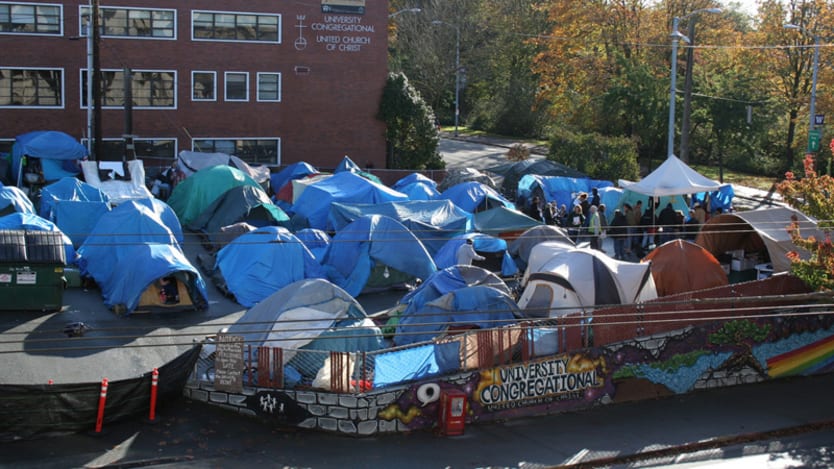
SEATTLE — Key leaders at a global development summit in Washington State warned the professional development community in the United States last week that domestic humanitarian problems such as homelessness, poverty, refugee resettlement, and immigrant deportation should occupy more of their attention.
Speaking at the annual Global Washington summit of aid, development, and public health professionals, University of Washington President Ana Mari Cauce urged the audience of over 400 to “think about the global right here in Washington.”
In addition to homelessness, a situation that parallels with shelter needs in the developing world, she cited the plight among her university’s 46,000 student body of refugees and “Dreamers,” undocumented immigrants who were brought to the U.S. as minors and are beneficiaries of the Deferred Action for Childhood Arrivals, or DACA, program.
“Global is not just out there,” Cauce said, citing her decisions last year to take the unprecedented step of hosting a tent city on the university’s flagship Seattle campus during the cold, damp winter months.
Local humanitarian crises affect the ability of a company such as Starbucks to pursue its global agenda, which recently included a pledge to hire 10,000 refugees, said John Kelly, the coffee multinational’s Senior Vice President for Global Public Affairs and Social Impact. “It is hard to get excited and energized about that when we are reminded every day of the sad reality and unique problem we have in Seattle right now,” he said, citing the fact that 2,000 young children are currently sleeping in cars.
“We have to fix this crisis in King County of unsheltered families,” Kelly said, acknowledging that shelter is not a solution to homelessness but an immediate need that can be provided. “Until we do that, our aspirations need to be checked.” King County is the jurisdiction home to the Seattle metropolitan area.
World Vision International President Richard Stearns drew a similar comparison that related global issues to domestic concerns. “Poverty in America is as much a prison for a young child as it is in South Sudan,” he said. “It just has different bars and prisons walls.” While poor children in the U.S. generally don’t lack clean water or food, they suffer the sociological effects of gang- and drug-infested neighborhoods, he said, arguing, “We have to invest in the bottom 20 percent of our country.”
The domestic situation has prompted Kelly to encourage volunteering locally rather than going abroad. “If you want to work with refugees, go to Mary’s Place,” he said, referring to a homeless shelter in downtown Seattle.
Over 11,000 people are homeless in King County. Seattle is the fastest growing big city in the U.S. and the cost of housing has risen dramatically, with the rate of increase in house prices leading the nation for 13 months straight. The city now has the third largest homeless population in the U.S., behind much larger cities New York and Los Angeles.
“City and county authorities have failed to make this a priority,” Kelly said, arguing that the combined expertise of the humanitarian relief organizations headquartered in and around Seattle could apply their talents locally. “This is our shame, something that we can’t stand by and allow to happen,” he said. In 2015, former mayor Ed Murray declared a state of emergency on homelessness, but the issue has only seemed to worsen.
He called on the audience “to hold our city and county accountable” the day after Jenny Durkan was inaugurated as Seattle’s new mayor following a campaign that focused heavily on the issue.
“Before we go out from Seattle and try to save the world, we have got to fix this problem,” Kelly said.
Read more Devex coverage on philanthropy.
